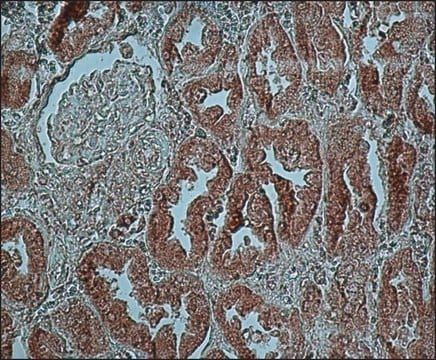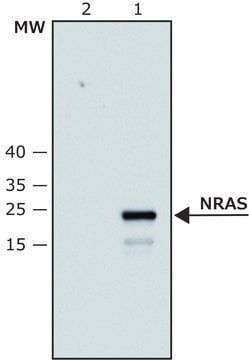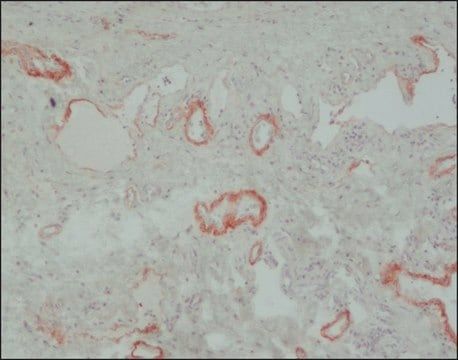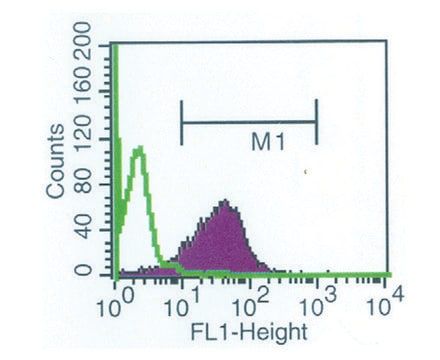SAB4200775
Anti-Glycoprotein (MDR) antibody, Mouse monoclonal
clone F4, purified from hybridoma cell culture
Manufacturer: Sigma Aldrich
Synonym(S): ABCB1, ATP-binding cassette sub-family B member 1, Multidrug resistance protein 1, P-glycoprotein 1
Select a Size
| Pack Size | SKU | Availability | Price |
|---|---|---|---|
| 100 μL | SAB4200775-100-μL | In Stock | ₹ 55,511.10 |
SAB4200775 - 100 μL
In Stock
Quantity
1
Base Price: ₹ 55,511.10
GST (18%): ₹ 9,991.998
Total Price: ₹ 65,503.098
biological source
mouse
Quality Level
200
antibody form
purified from hybridoma cell culture
antibody product type
primary antibodies
clone
F4, monoclonal
form
buffered aqueous solution
species reactivity
hamster, human
concentration
~1 mg/mL
technique(s)
flow cytometry: suitableimmunoblotting: suitableimmunocytochemistry: suitableimmunohistochemistry: suitableimmunoprecipitation (IP): suitable
isotype
IgG1
Description
- General description: Anti-P-Glycoprotein (MDR) antibody, mouse monoclonal (mouse IgG1 isotype) is derived from the hybridoma F4 produced by the fusion of mouse myeloma cells and splenocytes from BALB/c mice. Multidrug resistance protein 1 (MDR1) is a member of the adenosine triphosphate (ATP)-binding cassette (ABC) transporters superfamily. It is ubiquitously expressed in kidneys, intestines, placenta, liver, adrenal glands blood-brain barrier (BBB), placenta and testis.
- Specificity: Anti-P-Glycoprotein (MDR) antibody, Mouse monoclonal recognizes an epitope located at the N-terminal region of P-glycoprotein (Pgp), at the third extracellular loop of the molecule, also known as ABCB1 protein. The antibody specifically detects MDR1 P-glycoprotein, but does not recognize MDR3. Anti-P-Glycoprotein (MDR) cross reacts with MDR1 P-glycoprotein from human and hamster origin.
- Immunogen: a mixture of human and hamster drug-resistant whole cells and crude plasma membranes.
- Application: Anti-Glycoprotein (MDR) antibody, mouse monoclonal may be used in:immunoblottingimmunoprecipitationimmunocytochemistryimmunohistochemistrycellular enzyme-linked immunosorbent assay (ELISA)flow cytometry (FACS)cell surface radioimmunoassay (RIA)
- Biochem/physiol Actions: Multidrug resistance protein 1 (MDR1) functions as an adenosine triphosphate (ATP)-dependent efflux pump. It is also involved in extruding certain xenobiotics and protect cells from toxicants. MDR1 gene is overexpressed in different cancer types including leukemias, lymphomas, myelomas, breast cancer, ovarian cancer, gastrointestinal stromal tumor (GIST), non-small cell lung cancer (NSCLC), fallopian tube, colon, renal, and thyroid cancers. Overexpression of MDR1 gene plays an important role in prompting multidrug resistance in cancer chemotherapy causing high resistance of cancerous cells to a wide variety of substrate anticancer drugs.
- Physical form: Solution in 0.01 M phosphate buffered saline, pH 7.4, containing 15 mM sodium azide.
- Storage and Stability: For continuous use, store at 2–8 °C for up to one month. For extended storage, freeze in working aliquots. Repeated freezing and thawing is not recommended. If slight turbidity occurs upon prolonged storage, clarify the solution by centrifugation before use. Working dilution samples should be discarded if not used within 12 hours.
- Disclaimer: Unless otherwise stated in our catalog, our products are intended for research use only and are not to be used for any other purpose, which includes but is not limited to, unauthorized commercial uses, in vitro diagnostic uses, ex vivo or in vivo therapeutic uses or any type of consumption or application to humans or animals.
SAFETY INFORMATION
Flash Point(F)
Not applicable
Flash Point(C)
Not applicable
Compare Similar Items
Show Difference
biological source: mouse
Quality Level: 200
antibody form: purified from hybridoma cell culture
antibody product type: primary antibodies
clone: F4, monoclonal
form: buffered aqueous solution
species reactivity: hamster, human
concentration: ~1 mg/mL
technique(s): flow cytometry: suitableimmunoblotting: suitableimmunocytochemistry: suitableimmunohistochemistry: suitableimmunoprecipitation (IP): suitable
isotype: IgG1
biological source:
mouse
Quality Level:
200
antibody form:
purified from hybridoma cell culture
antibody product type:
primary antibodies
clone:
F4, monoclonal
form:
buffered aqueous solution
species reactivity:
hamster, human
concentration:
~1 mg/mL
technique(s):
flow cytometry: suitableimmunoblotting: suitableimmunocytochemistry: suitableimmunohistochemistry: suitableimmunoprecipitation (IP): suitable
isotype:
IgG1
biological source: rabbit
Quality Level: 200
antibody form: IgG fraction of antiserum
antibody product type: primary antibodies
clone: polyclonal
form: buffered aqueous solution
species reactivity: human
concentration: __
technique(s): immunoblotting: 1:2,000-1:4,000 using human HEK-293T cells over-expressing NRAS protein
isotype: __
biological source:
rabbit
Quality Level:
200
antibody form:
IgG fraction of antiserum
antibody product type:
primary antibodies
clone:
polyclonal
form:
buffered aqueous solution
species reactivity:
human
concentration:
__
technique(s):
immunoblotting: 1:2,000-1:4,000 using human HEK-293T cells over-expressing NRAS protein
isotype:
__
biological source: mouse
Quality Level: 200
antibody form: purified from hybridoma cell culture
antibody product type: primary antibodies
clone: BC-24, monoclonal
form: buffered aqueous solution
species reactivity: human
concentration: ~1.0 mg/mL
technique(s): ELISA: suitableflow cytometry: suitableimmunoblotting: suitableimmunohistochemistry: 5-10 μg/mL using pronase-retrieved formalin-fixed, paraffin-embedded human tonsil sections
isotype: IgG1
biological source:
mouse
Quality Level:
200
antibody form:
purified from hybridoma cell culture
antibody product type:
primary antibodies
clone:
BC-24, monoclonal
form:
buffered aqueous solution
species reactivity:
human
concentration:
~1.0 mg/mL
technique(s):
ELISA: suitableflow cytometry: suitableimmunoblotting: suitableimmunohistochemistry: 5-10 μg/mL using pronase-retrieved formalin-fixed, paraffin-embedded human tonsil sections
isotype:
IgG1





